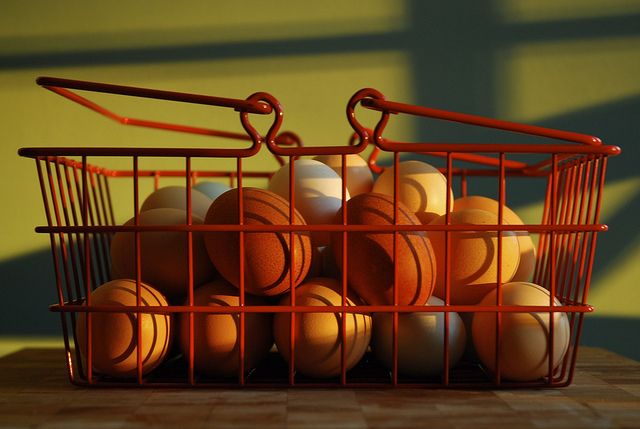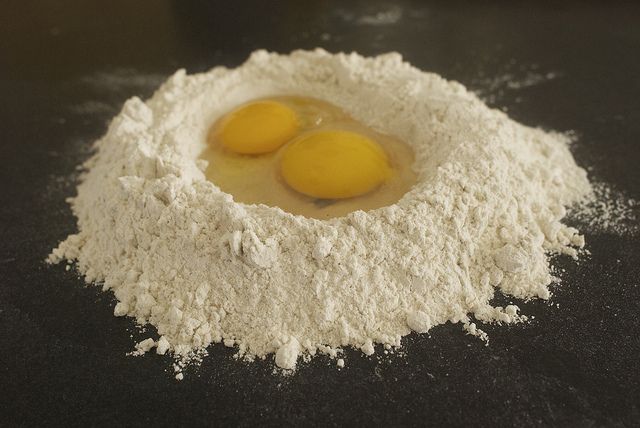Popular on Food52
26 Comments
BlueKaleRoad
October 31, 2011
This is a terrific article, Tom! I have 3 backyard hens and they are molting for the first time right now (looking like zombie chickens - just in time for Halloween!). I happy to know they'll lay higher quality eggs when they start laying again. Thanks for all this great info.
Jennifer A.
October 28, 2011
Thank you for the great information. I do have a somewhat ridiculous question, though - what determines the color of the shell? I was once told as a child that the color of the tail feathers of the chicken is a good indicator, but suspect it has more to do with the breed of bird - any ideas?
mainecook61
October 28, 2011
It has to do with the breed. My Buff Orpingtons lay brown eggs. My Leghorns lay white. Rhode Island Reds lay brown eggs, as do Barred Rocks. Araucanas lay pastel-colored eggs. New Englanders evidently prefer brown eggs, but I can't tell the difference in cooking. For a fun look at the kingdom of chickens, go the the online McMurray Hatchery catalog and check out all of the varieties! (This company is the source of many a backyard chicken; the chicks arrive in the mail.) This summer, our Silver Leghorn Rooster fathered a batch of chicks on a Buff hen. Will these chicks (which look like neither parent) lay brown eggs or white? Stay tuned.
thirschfeld
October 28, 2011
Breed is an indicator but the color of the ear lobes will tell you for sure. I am sure your leghorns have white tabs, maybe yellowish, by their ears while the others should be dark or red which produces brown eggs. I have some Americaunas that lay blue. I have a black Langshan Americauna mix and I am waiting to see what color her eggs will be.
mainecook61
October 28, 2011
Yes, you're right, the ear tabs are a marker for most of the production breeds. It's not quite as reliable a marker for some of the heritage breeds. Check out this crazy little chart:
http://www.ithaca.edu/staff/jhenderson/chooks/chooks.html
Quiz tomorrow!
You don't mention the breeds you raise yourself; do you have a favorite? Mine are the Buff Orpingtons, so friendly and gentle.
http://www.ithaca.edu/staff/jhenderson/chooks/chooks.html
Quiz tomorrow!
You don't mention the breeds you raise yourself; do you have a favorite? Mine are the Buff Orpingtons, so friendly and gentle.
thirschfeld
October 29, 2011
I have several breeds, Columbian Wyandottes, some Buff Orpingtons, a couple of Single comb Brown Leghorns and the Amerucaunas, the last two breeds being flighty. I have to say my favorite breed though is the Cuckoo Maran the French bird that lays the chocolate eggs. They, in my experience, are calm and rather friendly and a couple of them used to follow me around like a good dog would.
Jennifer A.
October 29, 2011
Thanks thirschfeld and mainecook61! This is really very interesting. My friend and I took her daughters out to a hobby farm this afternoon with lots of pretty birds - so much fun! - our favorites were the black and white mottled ones that looked like they were wearing pants. Cannot wait to impress them next visit with the ear marker / egg color smarts.
Teri
October 27, 2011
I have the best egg setup. My colleague at work raises chickens, and every week or two, she brings me a dozen and I give her $5. They are delicious: golden, juicy, saffron jewels. My side of the newsroom in Syracuse is pretty happy. And I'd like to think it's due, in part, to Brenda's eggs.
thirschfeld
October 29, 2011
Great for you and great for the flock owner. It is always nice to have help with the feed bill
mainecook61
October 27, 2011
Nice article on the joys of home-raised eggs. However, I'm not sure I agree with the no-wash policy. It's not always possible to avoid an egg getting dirt or poop on it, even with lots of clean litter in the nest. Here's what the Vermont extension service says, and it makes sense to me:
3. Never cool eggs rapidly before they are cleaned. The egg shell will contract and pull any dirt or
bacteria on the surface deep into the pores when cooled. Try to keep the temperature relatively
constant until they are washed.
4. Wash eggs as soon as you collect them. This helps limit the opportunity of contamination and
loss of interior quality.
5. Wash eggs with water 10 degrees warmer than the egg. This will make the egg contents swell
and push the dirt away from the pores of the egg. If you have extremely dirty eggs, a mild
detergent approved for washing eggs can be used.
Never let eggs sit in water. Once the temperature equalizes the egg can absorb contaminants out
of the water.
6. Cool and dry eggs quickly after washing. Store eggs, large end up, at 50-55°F and at 75%
relative humidity. If eggs sit at room temperature (75°F) they can drop as much as one grade per
day. If fertile eggs are kept at a temperature above 85°F for more than a few hours the germinal
disc (embryo) can start to develop. If fertile eggs are kept above 85°F over two days the blood
vessels of the embryo may become visible.
If eggs are stored properly in their own carton or other stable environment they should hold a
quality of Grade A for at least four weeks.
I wash an egg that looks like it needs it; otherwise, I just put them straight into the fridge.
3. Never cool eggs rapidly before they are cleaned. The egg shell will contract and pull any dirt or
bacteria on the surface deep into the pores when cooled. Try to keep the temperature relatively
constant until they are washed.
4. Wash eggs as soon as you collect them. This helps limit the opportunity of contamination and
loss of interior quality.
5. Wash eggs with water 10 degrees warmer than the egg. This will make the egg contents swell
and push the dirt away from the pores of the egg. If you have extremely dirty eggs, a mild
detergent approved for washing eggs can be used.
Never let eggs sit in water. Once the temperature equalizes the egg can absorb contaminants out
of the water.
6. Cool and dry eggs quickly after washing. Store eggs, large end up, at 50-55°F and at 75%
relative humidity. If eggs sit at room temperature (75°F) they can drop as much as one grade per
day. If fertile eggs are kept at a temperature above 85°F for more than a few hours the germinal
disc (embryo) can start to develop. If fertile eggs are kept above 85°F over two days the blood
vessels of the embryo may become visible.
If eggs are stored properly in their own carton or other stable environment they should hold a
quality of Grade A for at least four weeks.
I wash an egg that looks like it needs it; otherwise, I just put them straight into the fridge.
thirschfeld
October 27, 2011
Not in disagreement with your comment at all but that seems to be more for the person raising the eggs for themselves then the consumer. My beef with a lot of these things is that the eggs in a consumers home may come in and out of the fridge several times over several weeks well surpassing the 4 hour 40-140 temp rule which will allow bacteria that has entered the egg from an improperly washed egg to grow to a level where it could become and issue to someone susceptible and while that is not the egg producers fault I still don't want to make anyone sick. Maybe it is just the health department side of me coming out in combination with the farm extension side but I have always fallen somewhere in the middle. I have also been in hen houses where the owners have no roosts and the chickens roost with their rear end in the nesting boxes where the owners will then collect the eggs, sitting in piles of poop, maybe that day or the next or even the next. My point is there are good, and I mentioned this, people who raise great eggs and then there are those whose eggs I would not eat. It sounds like you raise great eggs and that is a wonderful thing. Thank you and that is great information that you posted from the Vermont extension. I would be curious to know what the Vermont health department has to say about it?
Droplet
October 26, 2011
I happen to be one of those people who prefer to use eggs from well raised birds and that has been keeping me from sharing several of my recipes, because I can't always find free range ones. I never make a big deal out of it, but sort of keep it as an important rule of mine--if the egg comes from an "egg machine", I'd rather live without it. Aside from that, any input on keeping eggs? Some people insist they need to be refrigerated, some older ladies say they used to keep them at room temperature out of the sun for weeks when they were growing up without there being anything wrong with them....
thirschfeld
October 27, 2011
I keep them in the fridge with the fat end up. As far as letting them sit on the counter, if you have eggs that are raised in a good environment and the eggs are fertile then leaving them on the counter is fine for a short period, you can't let them sit there for a month, but a few days won't hurt them. A chicken lays a clutch of eggs and really doesn't start to sit on them till she lays them all. If the eggs went bad there wouldn't be chicks. My point is fertile eggs can sit at room temp for a period of time.
Droplet
October 27, 2011
I keep them in the fridge too, but it's nice to have an actual logical answer to this. Thanks.
kahtemo
October 26, 2011
Very nice article...would have to argue with not washing the eggs though...chickens move their eggs, even in a nest box, with their feet which have been walking through chicken poop...just because the egg looks clean doesn't mean there isn't bacteria on it. When you crack the egg you risk driving the bacteria into the egg whites. We've been washing our chicken eggs for over 12 years and have never gotten sick from them. Also we call the little eggs "pullet " eggs...and love it when they are double yolks! Thanks for educating people on fresh farm eggs!
Angela @.
October 26, 2011
How does one go about finding a place or person to process the hens? I DO think this is much better than letting a bird waste away or get sick but have no idea what to do with a chicken once her laying days are over. Would love some advice.
hardlikearmour
October 26, 2011
This reminds me of when I was a kid, and we'd spend a week with our grandparents in the summer. My grandpa would kill the chicken. We'd help pluck the chicken. Not a fun job, but I think it's good to see where your food comes from.
SKK
October 26, 2011
I am with HLA in having spent summers on the farm with grandparents. It really isn't hard to process a hen and there are better ways now than my Grandmother wringing the chicken's neck. Here is a great youtube video of how to http://www.youtube.com/watch?v=vy_vutu5qO0
SKK
October 26, 2011
One of my grandmothers did that - and both ways were quick. Watching the video - a Porland farmer by the way - he says that it is hard on the meat. Who knows? It was all good to me.
thirschfeld
October 27, 2011
Angela, I don't know where you live but you might try by calling you state poultry association. That is where I started. They were very helpful and gave me the name of the state inspector who intern gave me the two state inspected processors that did small flock processing.
thirschfeld
October 27, 2011
hardlikearmour and SKK, the killing of the chicken, while not pleasant, is definitely the less labor intensive part of the job. Scalding and plucking is definitely no fun either. If more people had to clean their own birds less would eat chicken.
Oui, C.
October 26, 2011
Never knew about the "dropping them in water" test for age....very helpful, Tom.





See what other Food52 readers are saying.